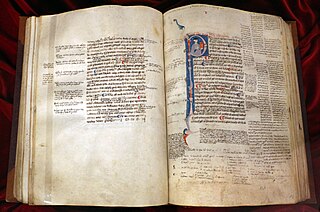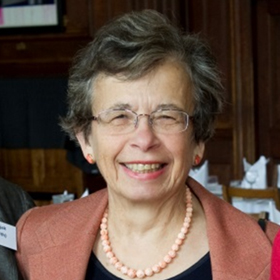Related Research Articles

Aristotle was an Ancient Greek philosopher and polymath. His writings cover a broad range of subjects spanning the natural sciences, philosophy, linguistics, economics, politics, psychology, and the arts. As the founder of the Peripatetic school of philosophy in the Lyceum in Athens, he began the wider Aristotelian tradition that followed, which set the groundwork for the development of modern science.

Jan Łukasiewicz was a Polish logician and philosopher who is best known for Polish notation and Łukasiewicz logic. His work centred on philosophical logic, mathematical logic and history of logic. He thought innovatively about traditional propositional logic, the principle of non-contradiction and the law of excluded middle, offering one of the earliest systems of many-valued logic. Contemporary research on Aristotelian logic also builds on innovative works by Łukasiewicz, which applied methods from modern logic to the formalization of Aristotle's syllogistic.
In logic and formal semantics, term logic, also known as traditional logic, syllogistic logic or Aristotelian logic, is a loose name for an approach to formal logic that began with Aristotle and was developed further in ancient history mostly by his followers, the Peripatetics. It was revived after the third century CE by Porphyry's Isagoge.

The Prior Analytics is a work by Aristotle on reasoning, known as syllogistic, composed around 350 BCE. Being one of the six extant Aristotelian writings on logic and scientific method, it is part of what later Peripatetics called the Organon.

The Renaissance of the 12th century was a period of many changes at the outset of the High Middle Ages. It included social, political and economic transformations, and an intellectual revitalization of Western Europe with strong philosophical and scientific roots. These changes paved the way for later achievements such as the literary and artistic movement of the Italian Renaissance in the 15th century and the scientific developments of the 17th century.
Friedrich W. Solmsen was a German-American philologist and professor of classical studies. He published nearly 150 books, monographs, scholarly articles, and reviews from the 1930s through the 1980s. Solmsen's work is characterized by a prevailing interest in the history of ideas. He was an influential scholar in the areas of Greek tragedy, particularly for his work on Aeschylus, and the philosophy of the physical world and its relation to the soul, especially the systems of Plato and Aristotle.
Jonathan Lear is an American philosopher and psychoanalyst. He is the John U. Nef Distinguished Service Professor in the Committee on Social Thought at the University of Chicago and served as the Roman Family Director of the Neubauer Collegium for Culture and Society from 2014 to 2022.

Angela Hunter "Angie" Hobbs is a British philosopher and academic, who specialises in Ancient Greek philosophy and ethics. She is Professor of the Public Understanding of Philosophy at the University of Sheffield.
Julia Elizabeth Annas is a British philosopher who has taught in the United States for the last quarter-century. She is Regents Professor of Philosophy Emerita at the University of Arizona.
Michael Frede was a prominent scholar of ancient philosophy, described by The Telegraph as "one of the most important and adventurous scholars of ancient philosophy of recent times."
Edith Hall, is a British scholar of classics, specialising in ancient Greek literature and cultural history, and professor in the Department of Classics and Ancient History at Durham University. She is a Fellow of the British Academy. From 2006 until 2011 she held a chair at Royal Holloway, University of London, where she founded and directed the Centre for the Reception of Greece and Rome until November 2011. She resigned over a dispute regarding funding for classics after leading a public campaign, which was successful, to prevent cuts to or the closure of the Royal Holloway Classics department. Until 2022, she was a professor at the Department of Classics at King's College London. She also co-founded and is Consultant Director of the Archive of Performances of Greek and Roman Drama at Oxford University, Chair of the Gilbert Murray Trust, and Judge on the Stephen Spender Prize for poetry translation. Her prizewinning doctoral thesis was awarded at Oxford. In 2012 she was awarded a Humboldt Research Prize to study ancient Greek theatre in the Black Sea, and in 2014 she was elected to the Academy of Europe. She lives in Cambridgeshire.

Gwilym Ellis Lane Owen was a British classicist and philosopher who is best known as a scholar of ancient philosophy. He was a specialist on the work of the Greek philosopher Aristotle.

John Corcoran was an American logician, philosopher, mathematician, and historian of logic. He is best known for his philosophical work on concepts such as the nature of inference, relations between conditions, argument-deduction-proof distinctions, the relationship between logic and epistemology, and the place of proof theory and model theory in logic. Nine of Corcoran's papers have been translated into Spanish, Portuguese, Persian, and Arabic; his 1989 "signature" essay was translated into three languages. Fourteen of his papers have been reprinted; one was reprinted twice.
Melissa Lane is an American academic and professor at Princeton University, where she holds the Class of 1943 professorship in the Department of Politics. She graduated summa cum laude from Harvard University in 1989 with a degree in Social Studies and later earned a M.Phil and Ph.D. in Philosophy from Cambridge University, where she also served as a lecturer. Lane joined Princeton's faculty in 2009. Throughout her career, she has received numerous honors, including a Marshall Scholarship, Truman Scholarship, Guggenheim Fellowship in 2012, and the Phi Beta Kappa Teaching Prize in 2015.
Mary Margaret Anne McCabe, known as M. M. McCabe, is emerita professor of ancient philosophy at King's College London. She has written books on Plato and other ancient philosophers, including the pre-Socratics, Socrates and Aristotle.
Alan Dodd Code is Ward W. and Priscilla B. Woods Professor of Philosophy and Professor of Classics at Stanford University, and also Professor Emeritus of Philosophy at UC Berkeley. He is a leading scholar of ancient Greek philosophy, especially well known for his articles on Aristotle's metaphysics, science, and logic.
Alison Simmons (born 1965) is an American philosopher and Samuel H. Wolcott Professor of Philosophy and Harvard College Professor at Harvard University. Her primary scholarly interests are in early modern theories of mind, the relationship between mind and body, natural philosophy, and sensory perception. With Barbara Grosz, she is co-founder of the Embedded EthiCS program at Harvard, which embeds ethics lessons into computer science courses.
Mary Louise Gill is the David Benedict Professor of Classics and Philosophy at Brown University. Her work primarily focuses on Plato, Aristotle, and other ancient philosophers.
Emma Dench is an English ancient historian, classicist, and academic administrator. She has been McLean Professor of Ancient and Modern History at Harvard University since 2014, and Dean of its Graduate School of Arts and Sciences since 2018. Her previous positions include Professor of Ancient History at Birkbeck College, University of London and Professor of Classics and of History at Harvard.

Miriam Tamara Griffin was an American classical scholar and tutor of ancient history at Somerville College at the University of Oxford from 1967 to 2002. She was a scholar of Roman history and ancient thought, and wrote books on the Emperor Nero and his tutor, Seneca, encouraging an appreciation of the philosophical writings of the ancient Romans within their historical context.
References
- ↑ "Classics Dept Faculty: Gisela Striker". Harvard University. Retrieved 14 January 2011.
- ↑ "Curriculum Vitae - Gisela Striker" (PDF). scholar.harvard.edu.
- ↑ Powell, Alvin (14 December 2000). "A peripatetic returns". Harvard University Gazette. Archived from the original on 29 June 2011. Retrieved 14 January 2011.
- ↑ "Gisela Striker's Exit Casts Program In Doubt | News | The Harvard Crimson".
- ↑ Degnan, M. 1994. Recent Work in Aristotle's Logic. Philosophical Books 35.2 (April, 1994): 81-89.
- ↑
- Review of "Aristotle, Prior Analytics: Book I, Gisela Striker (translation and commentary), Oxford UP, 2009, 268pp., $39.95 (pbk), ISBN 978-0-19-925041-7." in the Notre Dame Philosophical Reviews, 2010.02.02 Archived 2011-06-15 at the Wayback Machine .